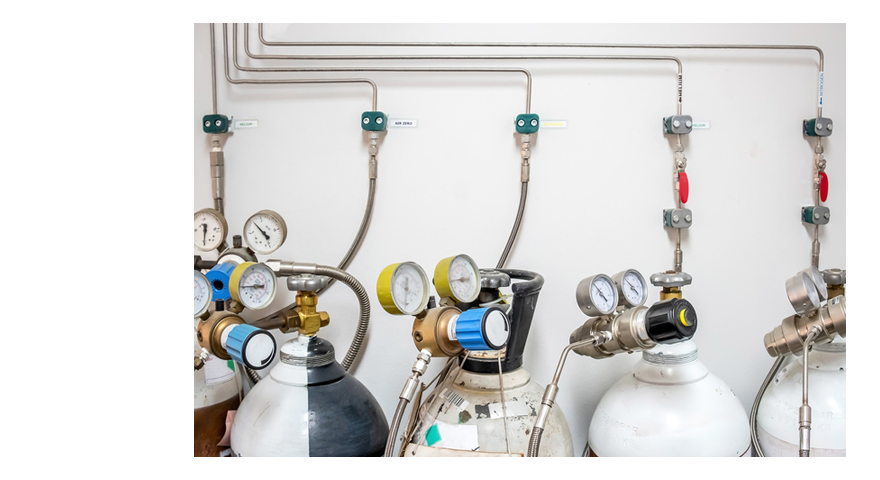Traditional pressure regulators use a combination of internal nozzles and springs to regulate how much pressure an application will be exposed to down the service line. As the operator turns the mechanical adjusting knob, a certain amount of pressure is allowed to pass thru the regulator. If less pressure is required, the knob is adjusted again, and less pressure is allowed thru. The internal spring controls the pressure based on its properties (number of coils, thickness of the coils, diameter of the coils, metal used, etc.) and the tension set by the knob.
There are times that air being fed to a process needs to be adjusted:
- Compressed air: higher demand is needed due to extra process lines are being turned on
- Medical: adjust pressure flow for analyzer process as the test changes specification
- Cooking: steam control to regulate the cooking process for high volume foods
- Quality Control: adjusting air pressure to a device to ensure it is leak free
- Painting: mixture of air and paint is changing due to environment conditions
- Time: being a mechanical device, the internal springs can change their tension and thus shift the pressure setting that they operator has set
The industry realized they need to make this pressure adjustment more automatic without intervention from an operator to allow for quicker and more precise adjustments. Conditions change, applications change, media changes and the regulator needs to automatically adjust to compensate. A pressure sensor is utilized in the Sold State Pressure Regulator system and provides constant feedback to the controller. As pressure rises (or falls) a signal is sent to the controller. The controller determines if a valve needs to be opened or close to meet the demand and preset that the user has defined. Being solid state, the regulator is more accurate and has lees moving parts which leads to a long lifetime.
Challenge: Finding a pressure sensor that can provide an accurate signal even when exposed to a high number of cycles as well as be airtight to prevent leaks.
When dealing with gases (air, oxygen, nitrogen, etc.) the molecules tend to be very small and will leak very easily thru any gaps in the plumbing or piping system. The whole system needs to be leak-free so the pressure required for the process is kept up to its maximum potential. Also, many of these applications have a high number of repetitious cycles. The pressure sensor needs to be able to withstand these repetitive cycles and demonstrate a long-life span to avoid premature failure.
Solution: 3100 Series Pressure Sensors
The new 3100 Series Pressure Sensors use no internal O-rings in the chamber that holds the media (air, nitrogen, coolant, oil, water, etc.). The stainless-steel pressure ports and sensing diaphragms are laser-welded together to make an air-tight leak-proof seal. This will prevent leaks today as well as years in the future as O-rings can break down being exposed to harsh cleaning chemicals as well as over time and cause leaks. Able to operate up to +125C and along with the 100 million cycle lifetime, the 3100 Series Pressure Sensors are a perfect fit to provide a continuous feedback of coolant pressure for your Solid-State Pressure Regulator application.

Adding the 3100 Series Pressure Sensors to your Solid State Pressure Regulator application is a large asset to ensure your equipment will have a long life and low maintenance requirement.
Features of the Gems 3100 Series Pressure Sensors:
- Exceptional Long-Term Stability = No need for costly field calibration or replacement
- Thermally compensated = Consistent performance under wide temperature conditions
- Stainless Steel body = Able to with stand harsh chemicals and gasses
- Sealed to IP67 = heavy water spray, power-washing
- Enhanced RFI, EMI, and ESD Protection = Clear uninterrupted signal in harsh electrical environments
- Computer Controlled Calibration = High 1:1 Interchangeability from unit to unit
- Passes 20G Vibration test and IEC Free Fall test = Rugged design to handle excessive shock and vibration conditions
Industries:
- Water & Wastewater
- Power Generation
- Specialty & Off-Highway Vehicles
- Transportation
- Alternative Energy
- Marine
- Semiconductors
Adjacent Products:
 SEARCH OUR RESOURCE CENTER
SEARCH OUR RESOURCE CENTER

